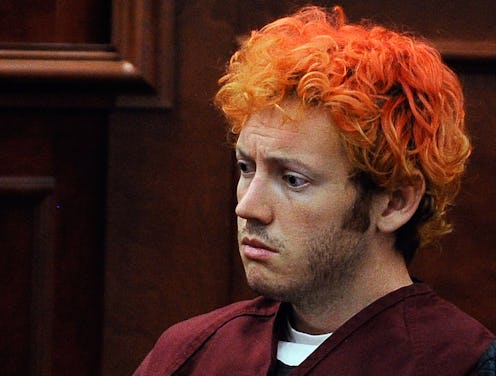News
Will The James Holmes Trial Be Televised?
This year, we'll see the trial of James Holmes, the man charged with killing 12 people and injuring 70 more in a horrifying mass shooting in Aurora, Colorado. But, as with any trial, there's no guarantee that we'll actually end up seeing any of it — so will James Holmes' trial be televised?
Luckily, in a trial bound to contain many challenging and unanswered questions, there's a pretty easy answer to this one: yes, the James Holmes trial will be televised. Basically, you'll be able to watch the trial's proceedings, but not through the lens of a television camera. Rather, you'll be watching a feed from the court's closed-circuit camera, a compromise arrived at by Judge Carlos Samour back in October 2014.
Under Samour's rules, the only source of video within the court will be a remote-controlled single shot, and according to the Los Angeles Times, it won't be allowed to zoom in without Samour's permission.
The restrictions make some sense, given the things that a judge might consider when weighing the decision. Not wanting to mar the decorum and seriousness of the proceedings, for example, or wanting to limit opportunities for tawdry media sensationalism — to allow television cameras in the court would also allow them to dramatically cut to Holmes' face whenever they wanted, an obvious tension-mounting angle that could be considered in very poor taste.
Holmes, 27, is charged with carrying out the infamous mass shooting at an Aurora, Colorado premiere of The Dark Knight Rises in 2012. It's taken a long time for his trial process to actually begin, repeatedly getting staggered and delayed, but jury selection is finally underway.
It's not expected to be done anytime soon, however — as Time notes, the selection process could take months, thanks in part to the incredible difficulty of finding Coloradans who don't know about the crime, and can be relied upon to render a fair judgement.
That Holmes committed the killings isn't in question, as his attorneys aren't even arguing that, but his plea of not guilty by reason of insanity will be what the jury must crucially consider. If they don't believe he was insane at the time, he'll almost surely be convicted, and possibly slated for execution. If they believe he was indeed insane, then he could be bound for a mental institution. Prosecutors have indicated that they'll be pushing for the death penalty.
